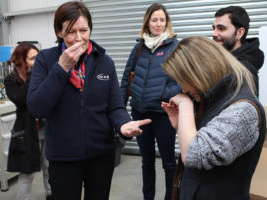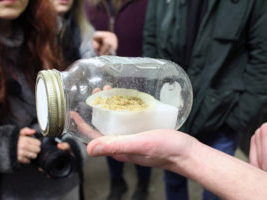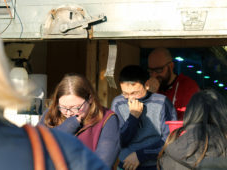[ad_1]
On 22 February 2018, 10 University of Cambridge early career researchers and PhD students joined young farmers for the Agri-TechE Early Career Innovators’ visit to NIAB Eastern Agri-Tech Innovation Hub in Soham (Cambs) in an event co-organised by Agri-TechE and CambPlants Hub. The Innovation Hub is part of the Bioboost project.
Below is a summary of the visit written by the early career researcher Dr Temur Yunusov who works in the field of plant-microbiome interactions at the Sainsbury Laboratory, Cambridge University. “We were able to see for ourselves the ingenious agri-tech innovation start-up companies based at the Hub, which is a purpose-built facility for farmers, entrepreneurs and other users wishing to engage in plant sciences applied research work to reduce all forms of waste in the food supply chain.”


Upon arrival, we were given a brief overview of the goal and history of the Hub by Industry Liaison Manager Denise Elliot, we then met representatives of the three start-ups working in the agri-tech space.
Meeting Celbius
First we met Dr. Steve Taylor, the founder of Celbius, the company using ultrasonic energy in agriculture to lower costs for extractions, fermentations and biotransformations of plant metabolites. Dr. Taylor told us about his journey from academic researcher to a start-up innovator and how he was using the expertise and experience he had gained throughout his career to create plant-based products for pest-control, cosmetics and even hinted at the possibility of plant-based plastics. Currently, he is working on extracting plant pigments from surplus and waste fruit and berries for future use in the cosmetics industry.
Meeting Aponic
We then met Jason Hawkins-Row of Aponic, the company developing vertical aeroponic farming systems for high-capacity, year-round production of high-value fruit, vegetables and herbs at the same time as reducing 80% of the water used. Jason gave us an impressive presentation, followed by a demonstration of the growth space, where we saw the high density and diversity of plants grown in a very small space with apparently very little energy consumption.
The more adventurous among us, who went as far as sampling some of the harvest, could attest to the high quality of the products. The farming solutions presented by Jason were “embarrassingly simple”, yet capable of sustainably solving many of the looming global food security issues ranging from soil degradation to water shortage to climate change, and could even be used as sustainable solutions for providing food during humanitarian crises.


Meeting Better Origin
Finally, we met with Joe Halstead of Better Origin (was Entomics), a start-up dedicated to developing sustainable and economically-viable solutions to the problem of food waste. Better Origin uses Black Soldier Fly (Hermetia illucens) to convert food waste into animal feed and fertilizers.
Joe showed us the entire chain of production from eggs to adult flies and how larvae were able to consume virtually all agricultural waste, even acidic fruits, which could pose a challenge for anaerobic digesters. Specifically, upon our visit, Joe was test-growing Black Soldier Fly larvae on citrus fruits. Considering the fact that about a third of the food grown globally is wasted, converting this waste into a sustainable solution is a very exciting prospect.
Agri-TechE’s Early Career Innovators’ Forum, kindly sponsored by The Morley Agricultural Foundation, is designed to help farmers and scientists understand more about each other’s worlds through a series of free to attend events.
Source link


